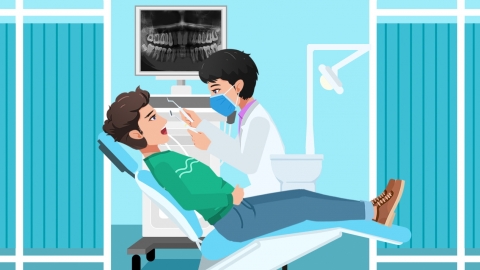What are the pros and cons of orthodontic treatment for adults?
Generally, orthodontic treatment involves installing an appliance on the teeth and applying gentle, continuous force to guide the teeth gradually into their ideal positions. The general reference price for orthodontic treatment ranges from 8,000 to 15,000 yuan per session. Noticeable improvement is usually observed within 1.5 to 3 years, although the treatment may be accompanied by symptoms such as tooth pain and discomfort. Benefits of orthodontic treatment for adults include improved aesthetics, enhanced oral health, correction of occlusal disorders, relief of dental crowding, and improved quality of life. However, drawbacks include prolonged treatment duration, oral discomfort, enamel demineralization and oral mucosal injury, high costs, and a high risk of relapse. A detailed analysis is as follows:

I. Benefits of Orthodontic Treatment for Adults
1. Improved Aesthetics
Orthodontic treatment can correct misaligned teeth, making them more aligned and aesthetically pleasing, which positively impacts personal appearance and boosts self-confidence.
2. Enhanced Oral Health
Properly aligned teeth facilitate better oral hygiene, reducing food debris and plaque accumulation, thereby lowering the risk of dental caries and periodontal disease.
3. Correction of Occlusal Disorders
Orthodontic treatment restores normal chewing function, reduces stress on the temporomandibular joint, and helps prevent and manage temporomandibular joint dysfunction syndrome.
4. Relief of Dental Crowding
Dental malformations may cause dental crowding. Orthodontic treatment can align previously disordered teeth into a neat arrangement.
5. Improved Quality of Life
Well-aligned teeth and proper occlusion improve chewing efficiency, aiding digestion and nutrient absorption, ultimately enhancing overall quality of life.
II. Drawbacks of Orthodontic Treatment for Adults
1. Prolonged Treatment Duration
Adults have completed skeletal growth, so teeth move relatively slowly. Orthodontic treatment typically requires 1.5 to 3 years or even longer. A lengthy treatment period demands sufficient patience and perseverance from the patient, which may affect daily life and work schedules.
2. Oral Discomfort
In the early stages of wearing an orthodontic appliance, symptoms such as tooth soreness, mouth ulcers, and oral mucosal abrasion may occur. The appliance may also affect eating, especially with hard or sticky foods, requiring an adjustment period to adapt to the foreign body sensation in the mouth.
3. Enamel Demineralization and Oral Mucosal Injury
Orthodontic appliances used during treatment may cause friction and pressure on the teeth, leading to enamel demineralization and tooth sensitivity. Additionally, the appliance may scratch or compress the oral mucosa, causing localized inflammation and conditions such as mouth ulcers or glossitis.
4. High Cost
Orthodontic treatment for adults is generally more expensive than for children, including costs for appliances, treatment, and follow-up visits. Prices vary significantly depending on the method and type of appliance, which may impose a financial burden on patients. Additional procedures such as tooth extraction or fillings further increase the overall cost.
5. Risk of Relapse
Adults face a relatively higher risk of relapse after orthodontic treatment, especially if retainers are not worn consistently or不良 oral habits persist. Relapse may necessitate repeat orthodontic treatment, increasing both time and financial costs.
It is recommended to visit a reputable hospital and undergo orthodontic treatment under a dentist's guidance to ensure its effectiveness and safety. During orthodontic treatment, adults should maintain good oral hygiene by brushing correctly, using dental floss and a water flosser, avoiding hard or sticky foods, and attending follow-up appointments as instructed by the dentist.




